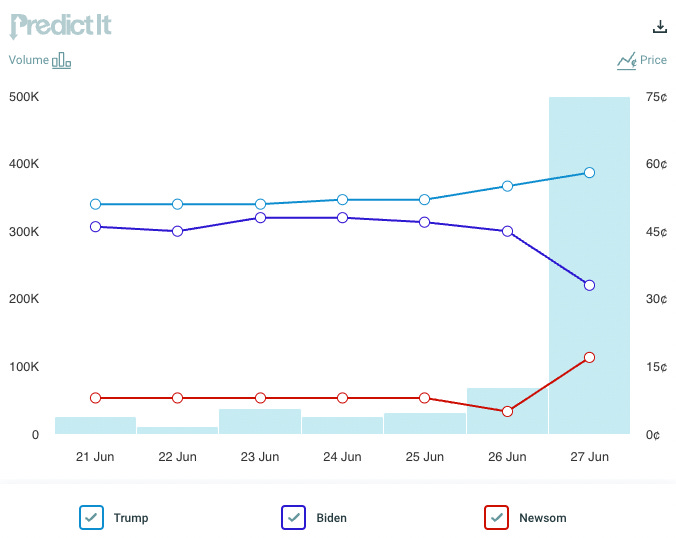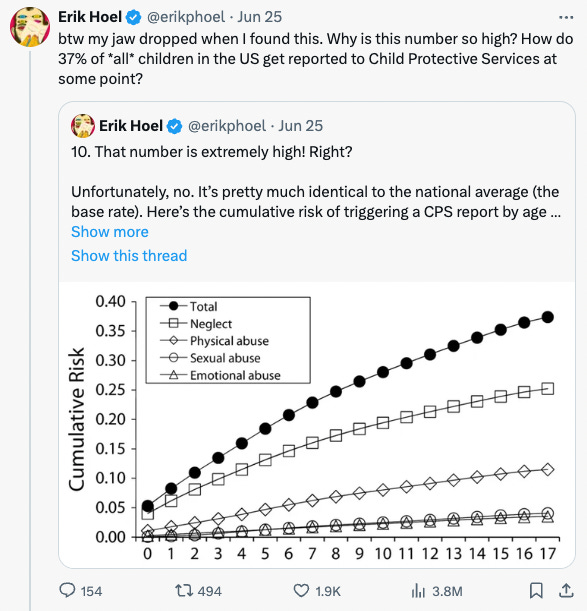Presidential debate shifts prediction markets. The internet shares CPS stories with me. Evopsych results fail to replicate. Emerson enrollment collapses.
Desiderata #27: links and commentary
The Desiderata series is a regular roundup of links and thoughts for paid subscribers, as well as an open thread and ongoing Ask Me Anything in the comments.
1/11. Prediction markets jumped significantly in Trump’s direction last night after the debate. Of which I watched what I could. I have a strong sympathetic shame response that makes sitting through both reality TV and presidential debates difficult (one wonders at the connection). I can stomach any horror movie but watching people bumble about live ends with me covering my head with a blanket.
Many gaffes were made. Many uncomfortable pauses occurred. Many long unrelated tangents materialized. Biden had a couple particularly bad moments, and prediction markets broke in Trump’s favor. In fact, in the market for the Democratic nominee, PredictIt now puts a Newsom candidacy well above Harris and into the realistic percentages.
It’s perhaps worth pointing out that Biden’s chances, at least according to the prediction markets, are not too much worse post-debate than in Nate Silver’s newly released model here on Substack based on previous polls alone (although on Polymarket Biden’s chances have dipped into the low 20s, which is indeed much worse). Obviously in the following days there may be a sea change of public opinion that the prediction markets are frontrunning and that op-ed writers are currently struggling to get ahead of.
Unfortunately, there has been too much denial of the realities of cognitive decline being unavoidable at the age of both candidates, our oldest ever. Just a few months ago The New York Times was writing on the subject that:
In other words, an individual’s age does not say anything definitive about their cognitive status or where it will head in the near future.
I vehemently disagreed, pointing out the unfortunate reality that neuroscience tells us our brains literally shrink following our 20s and pretty much all measures of cognition show decline over time. One hopes, of course, over most of our post-20s life cognitive decline is counteracted by an increase in wisdom, experience, and resources. And I think that’s true for a good long time. But it can’t be true forever.
2/11. Government agencies could sure use some surplus cognitive acumen. Following my post “Scientific American falsely links homeschooling to abuse,” a tweet of mine went viral when I pointed out the base rate of CPS reports in America was a whopping 37% (a statistic that SciAm’s editors, in a classic case of base rate neglect, never looked up before calling for universal background checks on homeschooling parents).
Millions of views led to hundreds of people publicly replying with their CPS stories. Some were heavy, sad, and personal. Some were explanations by mandated reporters or former agents. But the vast majority shared were frivolous to the degree of being (sometimes darkly) humorous. Of the frivolous category, here are a few of my anonymized favorites:
When I was 9 I got these weird welts on my back. Everyone thought my parents were abusing me, CPS got involved, the whole jazz. Turns out I was sliding in the bathtub after it drained, because it created a suction between the tub and my back, and it made a funny noise.




